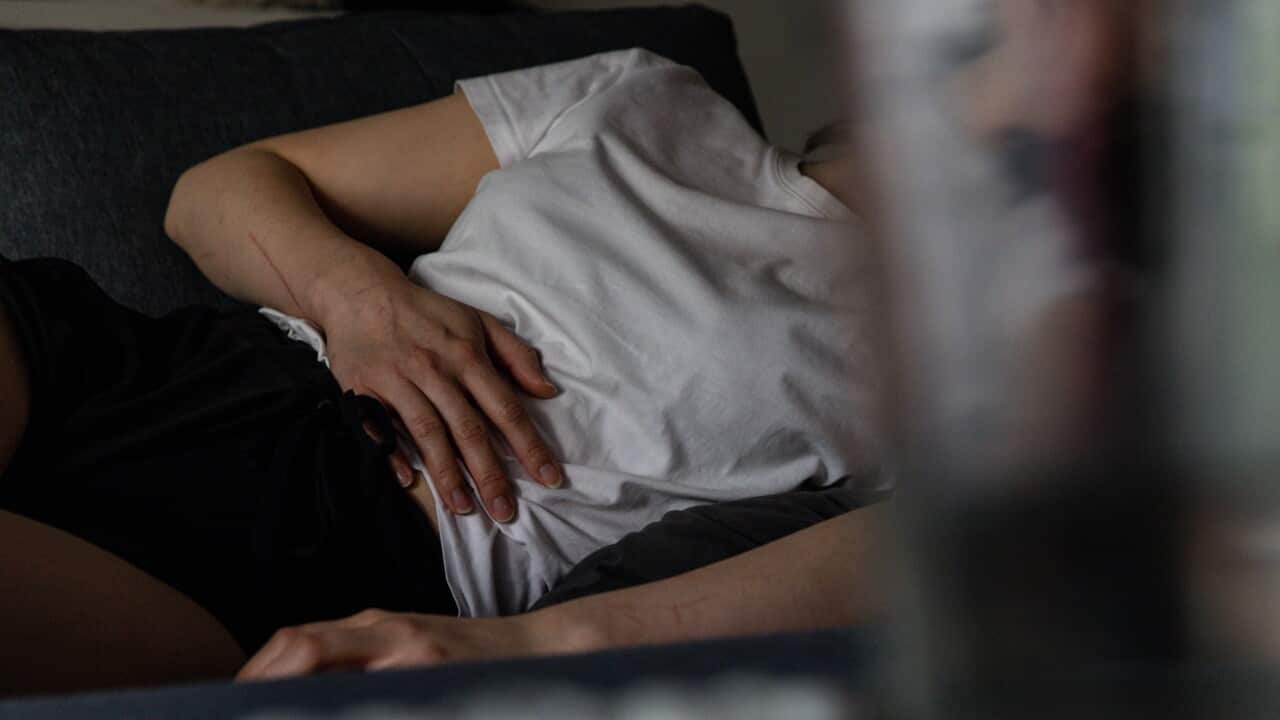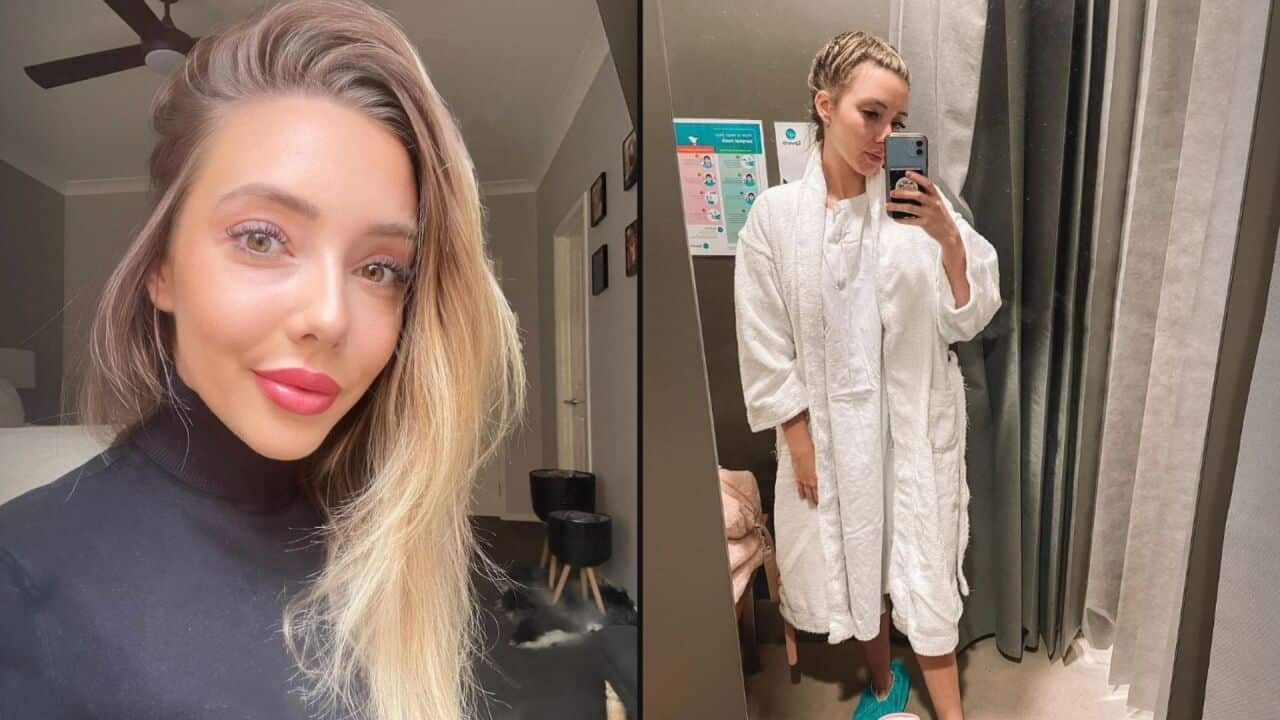Rebecca Buckley has never had a 'normal' period.
"It's always been incredibly heavy, like lasting longer than two weeks, intense pain, cramping - to the point where it impacted on my schooling," the 28-year-old from the Sunshine Coast told SBS News.
"I wasn't capable of doing things, really, around when my period occurred."
It took seven years - from when she first got her period at eight years old until she was 15 - for Rebecca to be, a chronic disease in which tissue similar to the lining of the uterus grows outside it.
Soon after, Rebecca had her first laparoscopic surgery.
"I thought that was the end of it, life would be good," she said.

Rebecca Buckley was diagnosed with endometriosis at 15, after years of extremely heavy and painful periods. Source: Supplied
"I'd just be in crippling pain, losing a lot of blood, undergoing blood transfusions, and trying things to slow down the bleeding - and it just wouldn't happen," she said.
After several months, the head of gynaecology at Rebecca's local hospital said something that shook her to her core.
"He said, 'You've got two options, and that's either to go and get yourself pregnant or I'm booking you in for a hysterectomy next month'," she said.
"It made it seem like it was an easy option.
"I was still a child."
It wasn't the last time Rebecca said she was "threatened" with a hysterectomy or told having a baby would solve all of her problems.
"What kind of medical advice is that … to tell underage females to go and get pregnant?" she said.
"It's so unethical."
Experiences like Rebecca's aren't uncommon.
While endometriosis has no known cure, a study published last year in found a majority of patients with the disease had been told that getting pregnant would help their symptoms.
Over half (56.5 per cent) of the more than 3,300 people surveyed by researchers from the University of Adelaide, the University of Sydney, and non-profit EndoActive were advised to have a baby to manage or treat their endometriosis.
Almost 90 per cent received that advice from one or more healthcare professionals - largely gynaecologists and GPs - despite neither Australian nor international clinical guidelines recommending it as a way to manage the disease.
"I knew that a lot of people had heard this advice from somebody … like a friend, a family member, some random person at a party, that kind of thing — but I didn't think that in the vast majority of cases, this was actually coming from healthcare professionals," Sylvia Freedman, co-founder of EndoActive and a co-author of the study, said.
"A lot of people who received this advice were taking it seriously and considered having a baby well before they were ready — whether they're not financially stable, too young, not in a relationship where they would want to have a baby with that person … there was a couple of instances of people who were in domestically violent relationships."
Only a third of those involved in the study felt the advice was appropriate given the situation they were in at the time.
"I'm sure it's, in most cases, well-intentioned advice," Freedman, who has endometriosis herself, said.
"It's just not appropriate … children are not treatment options."
Freedman said the advice was especially confusing given endometriosis can affect the fertility of those who have it.
"I think it lays on the pressure to have a baby young because if you're already thinking that your fertility has got a shelf life, anyway, if you add on having endometriosis … then you feel like there's this race against the clock," she said.
Professor Jason Abbott, a gynaecologist who helped to develop the Australian clinical practice guidelines for the diagnosis and management of endometriosis, said suggesting pregnancy was an effective treatment was "stupid" and made him "embarrassed" on behalf of his profession.
"There's really no biological basis for it, and certainly no scientific evidence for it," the professor of obstetrics and gynaecology at UNSW said.
Abbott said while the high levels of progesterone associated with pregnancy might temporarily reduce a patient's symptoms, it wasn't a guarantee.
"The scientific studies really show endometriosis lesions themselves can do a number of different things, and that is anything from regress to progress — but we've got evidence of that happening even in women who are not pregnant."
"The main issue is that with a pregnancy, this is not something you can stop and return if you don't like it.
"This has lifelong implications … physical, psychological, and financial."
Abbott said it was particularly "reprehensible" that Rebecca received the advice she did at such a young age.
"That's so wrong on so many levels," he said.
"We really need to take a long, hard look at ourselves as a profession to think that we're prescribing 15-year-olds pregnancy or hysterectomy as the only two options."
Abbott said it was clear there was a real need for improved education for all medical professionals.
"It's really so very poorly understood if all we can do as a profession is tell adolescent girls to get pregnant," he said.
"It shows a complete lack of understanding of the biology of the female pelvis, it shows a complete lack of understanding of the physiology of pain, and of the options that are available — and I think that it tells us that we have such a long way to go."
After "madly researching" doctors further afield, Rebecca managed to get under the care of one who specialises in endometriosis in young adults — and hasn't looked back.
Several laparoscopic surgeries later, she's had as much endometrial tissue removed as possible and is living "a relatively normal life".
While she still experiences some pain and discomfort, continuously taking the contraceptive pill is helping to manage most of her symptoms — at least for the time being.
"I live my life as full as I can now, because I know how debilitating it can be."
"I'm not back at that stage yet, and hope to never be."













